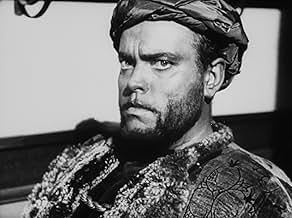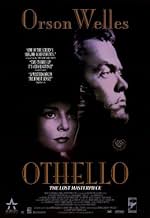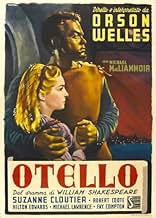PUNTUACIÓN EN IMDb
7,5/10
9,9 mil
TU PUNTUACIÓN
Un general moro es manipulado para albergar la idea de que su esposa le es infiel.Un general moro es manipulado para albergar la idea de que su esposa le es infiel.Un general moro es manipulado para albergar la idea de que su esposa le es infiel.
- Dirección
- Guión
- Reparto principal
- Premios
- 1 premio y 1 nominación en total
Abdullah Ben Mohamet
- Pageboy
- (sin acreditar)
Joseph Cotten
- Senator
- (sin acreditar)
Jean Davis
- Montano
- (sin acreditar)
Joan Fontaine
- Page
- (sin acreditar)
Robert Rietty
- Lodovico
- (voz)
- (sin acreditar)
Gudrun Ure
- Desdemona
- (voz)
- (sin acreditar)
Reseñas destacadas
Orson Welles' short, low-budget, and in places fairly odd look at Shakespeare's play. It suffers from some stage-bound performances which don't quite work (Micheal MacLiammoir as Iago, Robert Coote as Rodrigo) plus an undefined Desdemona from Suzanne Cloutier.
However, this aside, Welles is marvellous as the Moor driven to jealousy and murder, his voice rolling through the meat of Othello's speeches, his bronze make-up creating a skin for the great general. For this performance alone the film is valuable. And it looks absolutely fantastic, springing off from its financial limitations and adding a new dimension to the often-told story.
However, this aside, Welles is marvellous as the Moor driven to jealousy and murder, his voice rolling through the meat of Othello's speeches, his bronze make-up creating a skin for the great general. For this performance alone the film is valuable. And it looks absolutely fantastic, springing off from its financial limitations and adding a new dimension to the often-told story.
The power of Welles performance should make anyone not already an admirer stand up and take notice. The dark, brooding nature of Welles character sets the tone throughout this film. Each of the prominent characters seems to feed off this intensity, making each the better for it. The spartan sets and excellent use of lighting add to this powerful delivery making the words feel true and soul wrenching. I think this production could have been played out on a bare stage and still be regarded as a fine work, the dialogue and delivery is of such fine caliber. "The Moor of Venice" is a fine example of Orson Welles vast talents as a performer and director and should not be missed.
Right from the start, Othello has a striking visual style. Oblique camera angles (from low and high, close and far), nice use of shadows, a cool-looking castle. Really nice black-and-white imagery to look at.
On the other hand, I wasn't as convinced by the story and acting (but they grew on me as the film continued). There are many parts where actors seem to rush or mumble their lines. Shakespeare is hard enough to follow and a good performance should draw you in and make the dialogue *easier* to understand. Characters are often facing away so we hear their lines but can't see their mouths or their facial expressions. What's the point of acting then? I can act if acting means reciting lines from a Shakespearean play.
I have since learned that Welles was struggling with funds for the movie and that explains some of its short-comings. Especially with sound. He had to dub some of the lines himself and there remain parts which are clearly out of sync. It's hilarious to learn that he borrowed/took costumes from another movie to use on Othello. And that costumes weren't ready for one scene so he changed the location to a bathhouse with the actors in towels.
I find the story flawed. Iago is single-handedly able to manipulate Othello to his will. Iago is unlikable because of his misanthropy but Othello may be even more unlikable in his stupidity. He never thinks to properly analyse or question what Iago presents to him as the truth. He barely seems to communicate with his wife at all and becomes consumed by his obsessions and assumptions. But I do somewhat admire Iago's patience and intelligence, he makes a good villain. And there is real tragedy to what happens. It's conceivable that some unfortunate coincidences could help a seed of suspicion grow into the full-hearted conviction that you're being lied to. And to desire revenge is all too human. It's just funny that nobody suspects Iago. Othello would prefer to believe that everyone else is against him.
I found the ending climactic and meaningful. Some of it took me by surprise, other parts felt inevitable. I'm aware that Welles shortened the play a lot and may have taken liberties with it. At least I now have a rough idea of what Othello is about; I feel more educated. I liked all of the actors but Micheál MacLiammóir (a Dublin actor in his only feature film role) stands out as the antagonist. There's something about his eyes and calm indifference. Less is more.
Summarising, Othello is rewarding for its villain, its believable tragic turn of events and the enjoyable, creative cinematography. Now if only Othello could learn the scientific method...
On the other hand, I wasn't as convinced by the story and acting (but they grew on me as the film continued). There are many parts where actors seem to rush or mumble their lines. Shakespeare is hard enough to follow and a good performance should draw you in and make the dialogue *easier* to understand. Characters are often facing away so we hear their lines but can't see their mouths or their facial expressions. What's the point of acting then? I can act if acting means reciting lines from a Shakespearean play.
I have since learned that Welles was struggling with funds for the movie and that explains some of its short-comings. Especially with sound. He had to dub some of the lines himself and there remain parts which are clearly out of sync. It's hilarious to learn that he borrowed/took costumes from another movie to use on Othello. And that costumes weren't ready for one scene so he changed the location to a bathhouse with the actors in towels.
I find the story flawed. Iago is single-handedly able to manipulate Othello to his will. Iago is unlikable because of his misanthropy but Othello may be even more unlikable in his stupidity. He never thinks to properly analyse or question what Iago presents to him as the truth. He barely seems to communicate with his wife at all and becomes consumed by his obsessions and assumptions. But I do somewhat admire Iago's patience and intelligence, he makes a good villain. And there is real tragedy to what happens. It's conceivable that some unfortunate coincidences could help a seed of suspicion grow into the full-hearted conviction that you're being lied to. And to desire revenge is all too human. It's just funny that nobody suspects Iago. Othello would prefer to believe that everyone else is against him.
I found the ending climactic and meaningful. Some of it took me by surprise, other parts felt inevitable. I'm aware that Welles shortened the play a lot and may have taken liberties with it. At least I now have a rough idea of what Othello is about; I feel more educated. I liked all of the actors but Micheál MacLiammóir (a Dublin actor in his only feature film role) stands out as the antagonist. There's something about his eyes and calm indifference. Less is more.
Summarising, Othello is rewarding for its villain, its believable tragic turn of events and the enjoyable, creative cinematography. Now if only Othello could learn the scientific method...
I must be one of the few who saw this film (more than once!) before it vanished in the 60's. I saw it on TV in the last 50's, and later brought it to the small college where I was teaching 63-65. Though heavily cut and more than a little rearranged, it is one of the very finest of Shakespeare films. Performances are generally excellent and unified in style and diction. Welles, or course, is magnificent. Anyone who thinks he was never anything but a self-parodying ham has not seen this film. One could wish than MacLiammoir had had more overt FUN as Iago, who does what he does, in part at least, in an attempt to stimulate himself out of his blunted affect. The film also has some of the finest black-and-white cinematography of all time, and uses architecture in a unique and effective way.
Commenting on Shakespeare films is rather like admiring Easter Eggs.
First the inside: this was never a great play, relative to Shakespeare's other works. His great plays are about ideas, with characters as vectors to prod and activate them. This play is merely about characters, which makes it attractive to actors. That's certainly why Welles selected it.
Welles is the Sinatra of dramatic reading, with phrasing mastered in his radio days. All else is acceptable (at least to my tastes) so far as the play goes.
Now the shell, and here is what makes this film one of the most important. When Welles moved into film, he did so as an architect. He understood that great film constructs a space that includes the audience. So he worked with the most direct tools, buildings themselves. These sets are remarkable. I cannot imagine how he found them, how he could have seen the possibilities.
Selection aside, how he uses the spaces! View this film at least once in silence. I rate Welles as one of the 20th century's great architects and predict that this film will be mined when we get around to really creating cyberbuilding.
First the inside: this was never a great play, relative to Shakespeare's other works. His great plays are about ideas, with characters as vectors to prod and activate them. This play is merely about characters, which makes it attractive to actors. That's certainly why Welles selected it.
Welles is the Sinatra of dramatic reading, with phrasing mastered in his radio days. All else is acceptable (at least to my tastes) so far as the play goes.
Now the shell, and here is what makes this film one of the most important. When Welles moved into film, he did so as an architect. He understood that great film constructs a space that includes the audience. So he worked with the most direct tools, buildings themselves. These sets are remarkable. I cannot imagine how he found them, how he could have seen the possibilities.
Selection aside, how he uses the spaces! View this film at least once in silence. I rate Welles as one of the 20th century's great architects and predict that this film will be mined when we get around to really creating cyberbuilding.
¿Sabías que...?
- CuriosidadesWhen he made La rosa negra (1950), Orson Welles insisted that the coat his character wore be lined with mink, even though the lining would never be visible in the finished film. The producers acquiesced to this demand. When the shoot was over, the coat disappeared. In "Othello", Orson Welles can be seen wearing the same coat, complete with mink lining.
- Versiones alternativasThis film by Orson Welles, was 'restored' by a group in Chicago in 1991/2. The film was transferred to, and enhanced in video, (D1 format) retaining it as black and white. The audio was completely rebuilt, including the score, in Stereo Surround. All dialogue, however was original. This was a problem as some of the dialogue was distorted and unintelligible. John Fogelson, editor, was a major supervisor of the project. Ed Golya, Lorita DeLacerna, and Steve Wilke, were digital editors. And Ed Golya remixed the soundtrack. The process took 9 months. It was purchased for distribution by Castle Hill, and taken to New York where it went through another transformation before release. The restoration engineer in New York, Paul Michael, restored the audio that was supplied on 35mm optical negatives. He was able to remove the distortion, optical pops and surface noise that is inherent with Optical negatives. The restored audio was then sent to Sound One for the final mix. Unintelligible dialogue was replaced with 'sound-alikes'. This decision was made for the entertainment value of the film. The original mono music was then reintroduced into the final product. Basically, the film was retransferred, and the rebuilt sound effects tracks were added. This was done at Sound One, in NYC.. The credits were adjusted to place Lee Dickter (sp?) as Re-recording Mixer, and Ed Golya as Sound Effects Editor.
Selecciones populares
Inicia sesión para calificar y añadir a tu lista para recibir recomendaciones personalizadas
- How long is Othello?Con tecnología de Alexa
Detalles
- Fecha de lanzamiento
- Países de origen
- Sitios oficiales
- Idiomas
- Títulos en diferentes países
- Othello
- Localizaciones del rodaje
- Castle, El Jadida, Morocco(cistern interior)
- Empresas productoras
- Ver más compañías en los créditos en IMDbPro
Taquilla
- Recaudación en Estados Unidos y Canadá
- 28.980 US$
- Fin de semana de estreno en EE. UU. y Canadá
- 6010 US$
- 27 abr 2014
- Recaudación en todo el mundo
- 28.980 US$
- Duración1 hora 30 minutos
- Color
- Relación de aspecto
- 1.37 : 1
Contribuir a esta página
Sugerir un cambio o añadir el contenido que falta

Principal laguna de datos
By what name was Otelo (1951) officially released in India in English?
Responde

































